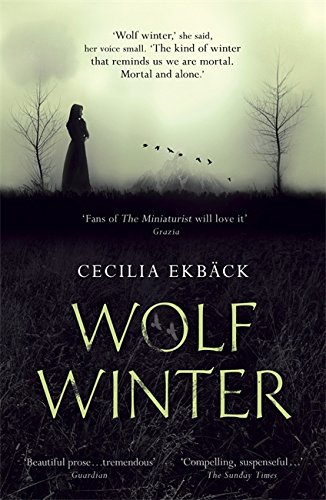I've been catching up on my foreign crime fiction; books I missed when they first came out, or simply didn't know about.
I came across this one on the shelves of my local bookshop - The Edge Of The World Bookshop - for which I should truly thank them.
"Wolf Winter" by Cecilia Ekbäck (Paperback, 2015, Hodder).
Imagine you are a woman come to a remote new country with two daughters, a few goats, a cow - and crops to grow and harvest. Imagine mountains where you have known only marshland and lakes; new neighbours whose ways you don't know... and a husband who has to leave for a job on the coast many miles away. It is 1717 in Northern Sweden, territory newly claimed from the native, nomadic, Sami reindeer-herders. It is a bitterly harsh winter; one the local settlers call a "wolf winter".
One day your young daughters find the body of man in a forest glade. Everyone says wolves killed him. But you don't think so. You are stubborn and curious and you want to know the answer to the mystery. But it is so cold that you don't know where to begin to feed yourself and your daughters. One day the wolves start to howl and move closer. And then the dead man begins to appear to your adolescent daughter Frederika. Welcome to the story of Finnish settler Maija and her family.
Historical Nordic Noir? I have never tried that one before. I couldn't resist this blend of crime, historical fiction and the tingle of the supernatural.This is not only a gripping and beautifully written story but a first novel, a very impressive one. Swedish-born Ekbäck currently lives in Canada. But her family roots lie in the country where she sets this novel. Her writing and prose plunged me straight into the bitter cold of the "Wolf Winter" of the title; spelling out rules for survival in this harsh land in all their necessary detail. She also gives us insight into the life of a settler community in 18th century Swedish Lapland where the Church not only records and educates individuals but makes and enforces the law. Mutual distrust between the new settlers and the Sami (Lapp) reindeer-herders gives more room for suspense as the stubborn Maija sets out to find out who killed the man in the forest - and why. Against the background of poverty and hardship during a time of perpetual war, Ekbäck has created a blend of frontier-Western and Nordic-noir; a tense whodunit which combines the dangers of the spirit world with the privations and threats of frontier life. It is peopled by characters well-realised if not always likeable and I think it is an exciting, beautifully written and impressive first novel.
Ekbäck has said that she decided against creating a series based on Maija but came to wonder about the country itself through the passage of time, the Blackasen Mountains. I shall certainly be on the look-out for her second novel - In the Month of the Midnight Sun - to be published later this year and set in the same area of the far north of Sweden, this time in 1856 and during the heat and daylight of the Northern summer.


No comments:
Post a Comment